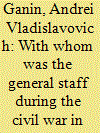|
|
|
Sort Order |
|
|
|
Items / Page
|
|
|
|
|
|
|
| Srl | Item |
| 1 |
ID:
162702


|
|
|
|
|
| Summary/Abstract |
The article is concerned with the underground anti-Bolshevik work in the Red Army of assistant commander of the Soviet Southern front, former General A.L. Nosovich, one of the senior Soviet military leaders at the time. The unearthing of a unique personal archive for General Nosovich in France has allowed us to explore this matter in greater depth. The activity of the highly educated and high-ranking White agent former General A.L. Nosovich agent in the Red Army in May–October 1918 is extremely interesting because it allows for reassessment of a number of issues, including the history of the formation of the Red Army, the history of the White underground, the work of the military specialists and the evolution of command cadres within the Red Army, the defense of Tsaritsyn, and the activities of I.V. Stalin at the time.
|
|
|
|
|
|
|
|
|
|
|
|
|
|
|
|
| 2 |
ID:
169470


|
|
|
|
|
| Summary/Abstract |
The article introduces previously unknown archival documents about the participation in the White movement in the East of Russia of the future Marshal of the Soviet Union, L. A. Govorov. Discovered documents from the Russian State Military Archives established that Govorov, after his transition to the side of the Red Army in December 1919, was hiding his role in the rank of Lieutenant by the order of Admiral Kolchak in July 1919. Apart from that, Govorov hid the fact of his voluntary enlistment into the service of the Whites in the fall of 1918 and other details of his path of fighting in the anti-Bolshevik camp.
|
|
|
|
|
|
|
|
|
|
|
|
|
|
|
|
| 3 |
ID:
153496


|
|
|
|
|
| Summary/Abstract |
The problem of delimiting the Russian officer corps and its choice during the Civil War in Russia (1917–1922) is related to a number of the central and most complex questions of the history of that era, which historians have been yet trying to answer for a century. This issue has not only scholarly but also great social importance. Established opinions on the correlation of the officer corps with respect to the armies and camps of the Civil War have not been developed in historiography. Moreover, depending on ideological predilections of the different authors, one encounters statements about either the general anti-Bolshevism of the officer class or, on the contrary, its general loyalty to the Bolsheviks. Obviously, both these theses are far from reality. Moreover, there are individual publications in the latest historiography that cite a multi-faceted analysis of the split of various groups of the officer corps.
|
|
|
|
|
|
|
|
|
|
|
|
|
|
|
|
| 4 |
ID:
123227


|
|
|
|
|
| Publication |
2013.
|
| Summary/Abstract |
The history of the Red Army in the Civil War of 1918-1922, in its significant part, was a history of mass treason and desertion of thousands of former officers (military specialists). Among them there were hundreds of General Staff specialists, the real representatives of Soviet military elite, whose treason was extremely dangerous for the fate of Soviet Russia. The treasons were both individual and group when the whole Soviet staffs fled to the Whites. Among the defectors there were representatives of almost all staff and command levels including several army commanders. These specialists of high qualification with academic background were aware of Soviet war plans, mobilization questions, and other classified data and could issue harmful orders before their defection to the enemy and influence the situation on the front. This article describes the reasons, history, circumstances, and results of this process that remained widespread until the decisive victories of the Reds in 1920. According to the calculations by Andrey Ganin, based on the vast, previously unknown data from Russian archives, almost every third General Staff specialist deserted the Red Army during that war. In spite of this, Bolsheviks managed to unite the experience of the military professionals with the new administrative methods and 'with iron and blood' organized powerful and effective military force which finally gained victory in the Civil War.
|
|
|
|
|
|
|
|
|
|
|
|
|
|
|
|
|
|
|
|
|